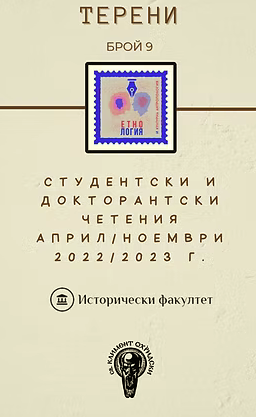Атомната сила в американските антикомунистически филми от 60-те години
DOI :
https://doi.org/10.60053/TER.2024.9.143-153Ключови думи :
Atomic power, Atomic cinema, Fail-safe, Ice Station Zebra, American anticommunist filmsРезюме
The purpose of this paper is to connect the basic Cold war’s elements, such as East – West confrontation, possibility of World War Three and cinema, to represent an authentic picture of 1960s society’s anxiety. Atomic power is a basis for an armament race and the following modernization in the Capitalist and Communist countries. The super power leaders’ must maintain a constant connection between themselves in order to avoid atomic Armageddon. The next step is to initiate a peaceful cooperation between the Americans and the Soviets. Cinema gives an opportunity for everyone around the world to learn new knowledge in an unconventional way. After that, they can express opinion based on experience and sometimes even on propaganda and educational movie content. The phenomenon of “atomic cinema” is set, which can be included in several film categories, because atomic bomb can affect life in all dimensions. The case study of two movies “Fail-safe” and “Ice Station Zebra” is important to illustrate paranoia and tensions during and after the Cuban missiles crisis. Protagonists’ choices and actions reflect not only in immediate conflict between them, but also on the world around them. Fantasy and reality couldn’t be easily distinguished, because of the specific relationship between cinema and life itself.
Библиография:
Властанова, Магдалена. “Dr. Strangelove or: How I learned to stop worrying and love the bomb – Комунизмът като реална или имагинерна заплаха за САЩ през 60-те години на XX век.” Анамнеза, Год. XV, кн. 4, (2020): 28-43.
Address Before the General Assembly of the United Nations on Peaceful Uses of Atomic Energy. New York City. December 08, 1953. The American Presidency Project. (27.01.2023) https://www.presidency.ucsb.edu/documents/address-before-the-general-assembly-the-united-nations-peaceful-uses-atomic-energy-new
Adler, Renata, Vincent Canby, Howard Thompson. “The Screen: ‘Ice Station Zebra’ at the Cinerama.” The New York Times, (21 December 1968). (02.01.2023)
https://www.nytimes.com/1968/12/21/archives/the-screen-ice-station-zebra-at-the-cinerama.html
An Act for the Development and Control of Atomic Energy. August 1, 1946, Pub. L. 79–585. Atomic Energy Act of 1954. 30 August 1954. Pub. L. 83-703.
Cantelon, Philip L., Richard G. Hewlett, Robert C. Williams (eds.). The American Atom: A Documentary History of Nuclear Policies from the Discovery of Fission to the Present. Philadelphia: University of Pennsylvania Press, 1991.
Collins, Austin. “Watching Fail Safe at the End of the World.” Vanity Fair. (8 May 2020.)
(07.01.2023) https://www.vanityfair.com/hollywood/2020/05/shut-in-movie-club-fail-safe-coronavirus
DeRosa, John P. Narrativized Strategic Choice. Maryland: Rowman & Littlefield, 2020: 52-55.
Ebert, Roger. Ice Station Zebra. Review. (21 April 1969). (02.01.2023) https://web.archive.org/web/20151001131743/http:/www.rogerebert.com/reviews/ice-station-zebra-1969
Ebiri, Bilge. “Fail Safe: Very Little Left of the World.” Criterion. (29 January 2020). (26.01.2023) https://www.criterion.com/current/posts/6801-fail-safe-very-little-left-of-the-world
Espinal, Megan. “Fail safe 1964, 2000.” Saturday Evening Post. (22 February 2013). (24.01.2023) https://www.saturdayeveningpost.com/2013/02/fail-safe-1964-2000/
Fail Safe. Sidney Lumet. American Film Institute. (06.01.2023) https://catalog.afi.com/Catalog/moviedetails/22481
Harpole, Charles Henry. History of the American Cinema. California: University of California Press, 2003: 169-185.
Ice Station Zebra. John Sturges. American Film Institute. (06.01.2023)
https://catalog.afi.com/Catalog/moviedetails/22940?fbclid=IwAR3A_lotiIrz9Kt7W2-Z73JFLhOgLaHi7nYWgStXzuYjXCWD7pjIy6xBbro
Jacobs, Robert. “Radiation as Cultural Talisman: Nuclear Weapons Testing and American Popular Culture in the Early Cold War.” The Asia Pacific Journal, Vol. 10, Issue 26, № 1, (17 June 2012).
Jacobs, Robert, Mick Broderick. “Nuke York, New York Nuclear Holocaust in the American Imagination from Hiroshima to 9/11.” The Asian Pacific Journal, Vol. 10, Issue 11, № 6, (5 March 2012).
Kotlowitz, Robert. “Performing Arts. Ice Station Zebra.” Harper’s Magazine, Vol. 238, (January- June 1969): 374.
Miller, Byron S. A Law is Passed – The Atomic Energy Act of 1946. The University of Chicago Law Review, Vol. 15, № 4, 1948.
National Committee for a Sane Nuclear Policy (SANE). The Martin Luther King, Jr. Research and Education Institute. Stanford University. (06.01.2023) https://kinginstitute.stanford.edu/
Nuclear Test Ban Treaty. 5 August 1963. John F. Kennedy Presidential Library and Museum. (26.01.2023) https://www.jfklibrary.org/learn/about-jfk/jfk-in-history/nuclear-test-ban-treaty
Orwell, George. “You and the Atomic Bomb” Tribune, (October 19, 1945). (24.01.2023) https://www.orwell.ru/library/articles/ABomb/english/e_abomb
Seed, David. American Science Fiction and the Cold War: Literature and Film. London: Routledge, 2013: 1-14.
Shapiro, Jerome F. Atomic Bomb Cinema: The Apocalyptic Imagination on Film. New York: Routledge, 2002.
Sherrod, Robert (ed.) “Fail-Safe by Eugene Burdick” Saturday Evening Post, vol. 235, № 36, (13 October 1962).
Sherrod, Robert (ed.) "Fail-Safe" Part Two by Burdick & Wheeler.” Saturday Evening Post, vol. 235, № 37, (20 October 1962).
Sherrod, Robert (ed.) “Fail-Safe-conclusion (Burdick)” Saturday Evening Post, vol. 235, № 38, (27 October 1962).
Smith, Austin. “Clooney’s ‘Fail safe’ Fails – in Spite of Success. Live Cold War Drama Has no Point Today.” New York Post, (April 10, 2000). (04.01.2023) https://nypost.com/2000/04/10/clooneys-fail-safe-fails-in-spite-of-success-live-cold-war-drama-has-no-point-today/
Suid, Lawrence H. Guts and Glory: The Making of the American Military Image in Film. Kentucky: The University Press of Kentucky, 2002.
Treaty on the Non-Proliferation of Nuclear Weapons (NPT). 1968. United Nations. (27.01.2023) https://www.un.org/disarmament/wmd/nuclear/npt/
Variety Staff. “Ice Station Zebra.” Variety, (31 December 1967). (02.01.2023) https://variety.com/1967/film/reviews/ice-station-zebra-1200421623/
Windrum, Ken. From El Dorado to Lost Horizons: Traditionalist Films in Hollywood Renaissance 1967-1972. Albany: State University of New York, 2019: 51-73.






